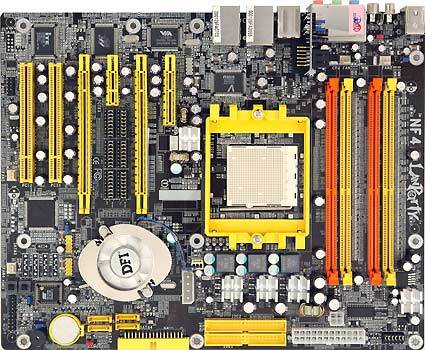The GeIL CL 1.5 DDR600 RAM Promise
Test Motherboard: DFI LANParty UT NF4 Ultra-D
The LANParty UT nF4 Ultra-D conforms to the layout of its bigger SLI brother, the LANParty NF4 SLI-DR. Its outfitting also follows that other board closely. DFI's successful recruitment of master engineer Oskar Wu appears to have changed its fortunes substantially, because LANParty motherboards are widely and favorably regarded nowadays as good choices for gamers and PC enthusiasts of all stripes. Even their overclocking capabilities have risen to a new level.
That's why we weren't surprised to see BIOS support for the GeIL recommended Turbo-mode setting of CL 1.5 in the LANParty UT nF4 Ultra-D motherboard, either.
The LANParty nF4 Ultra-D motherboard is NVIDIA's nForce4 Ultra chipset. This remains the most sought-after building block for PCI-Express support with the Athlon 64. While there are a few options for socket 754 available, most of the future rests on Socket 939 with dual-channel memory the dominant choice by far. Thanks to this chipset, this particular motherboard offers two Gigabit Ethernet ports, a usable sound system, and 4 SATA ports (with support for SATA-II and Native Command Queuing), along with obligatory PCI-e and conventional PCI slots in quantities sufficient to make most users deliriously happy. An additional Silicon Image controller with four additional SATA connections is reserved for the big brother alone, along with an SLI chipset. We also like the board's layout, which is designed to be cooled easily with a single case fan, as well as inclusion of power and reset buttons right on the motherboard.
As a side note, DFI may also be a little touchy about 1.5 terminology: in 2003, a LANParty motherboard that included the KT400A chipset from VIA sported a customized RAID controller. This supported what DFI called RAID 1.5, which upon further investigation proved to be nothing more than stepped-up version of RAID 1 that could access both drives in parallel while reading data. Today's RAID chips make this kind of functionality unnecessary and passé.
Get Tom's Hardware's best news and in-depth reviews, straight to your inbox.
Current page: Test Motherboard: DFI LANParty UT NF4 Ultra-D
Prev Page Our Consensus: Only CL2.0 Until Now Next Page Test Setup
Patrick Schmid was the editor-in-chief for Tom's Hardware from 2005 to 2006. He wrote numerous articles on a wide range of hardware topics, including storage, CPUs, and system builds.
